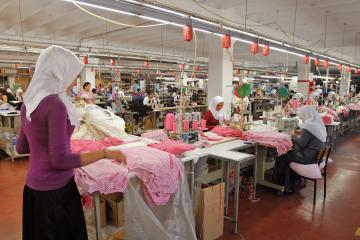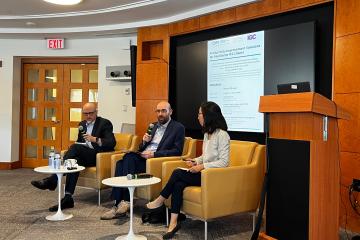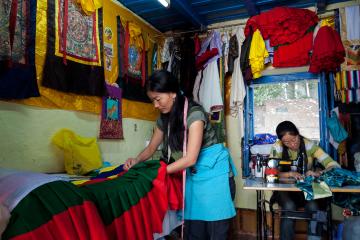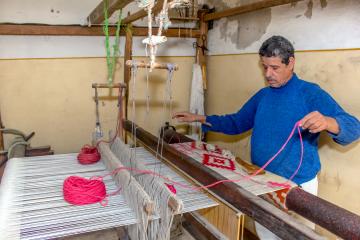Helping small and mid-sized businesses make connections with new buyers, and with each other, leads to growth, higher productivity, and better jobs.
Connections help small and mid-sized businesses reach new markets. Impact investors, economic development agencies, and larger corporations can help small businesses connect to larger or wealthier markets, enabling them to boost sales, make more money, and create jobs. The know-how gained from these connections with buyers also makes small businesses more productive.
Networks help local entrepreneurs and business managers connect with each other and learn from peers. These links lead businesses to share useful information and contacts, trade with one another, and even team up for new business collaborations, which is especially useful for young and growing businesses.
Multinational companies and digital platform providers can adopt evidence-informed strategies to make markets more inclusive. Expanding sourcing from small and mid-sized businesses can benefit communities where multinational companies operate. Digital marketplaces connect huge numbers of buyers and sellers quickly. Governments also have a role to play by making public procurement work for smaller firms.
In low- and middle-income countries, 90 percent of jobs come from the private sector. Most of the businesses that employ people are small—sometimes only a few employees—and they often struggle to make money. With access to reliable buyers, bigger markets, and more networking opportunities, promising businesses can grow and hire more workers, boosting the local economy and helping reduce poverty.
Directly connecting small businesses to larger, wealthier markets they wouldn’t reach on their own helps them make more money. Small businesses often can’t afford to search for large buyers or consumers in foreign markets who may be willing to purchase at higher quantities and prices. Programs that facilitate these connections often increase sales and profits.
In addition to boosting sales, access to new markets helps entrepreneurs run smarter and more effective operations. Programs that encourage and make exporting easier are especially effective at promoting learning. Foreign buyers may have higher quality expectations, leading local businesses to change their techniques to match these expectations. In Egypt, for example, connecting small rug manufacturers with foreign buyers increased profits and rug quality after just a few months. In Myanmar and Bangladesh, links to multinational buyers led to improved management practices and worker safety at local factories.
Export opportunities bring broad benefits beyond short-term growth. When local businesses in low- and middle-income countries connect to export markets, they often create more jobs, pay higher wages, and offer more stable work. Recent studies also show that exporting can support greater economic inclusion—for example, in Myanmar, by increasing employment and earnings for women, especially when businesses export goods typically produced by women. These gains suggest that access to global markets can help improve livelihoods and promote social inclusion in some cases.
Connections within markets matter too. When small businesses connect with each other, they can share useful information. In China, strengthening connections between local businesses through informal meetups and shared associations led to lasting gains in business performance. Networking can be especially helpful for women, who may not have large professional networks already; in Ghana, after women entrepreneurs were invited to join WhatsApp networking groups, they sold improved products and used marketing techniques that helped them make more money.
Global buyers, digital marketplaces, and public procurement can all drive growth by making it easier for smaller businesses to sell. Still, research finds that small businesses don’t automatically benefit from market expansion. Often, digital markets can be too crowded, and procurement processes can lack transparency. Improving market access and pairing it with capacity building for smaller firms can help ensure success.
Cost and design considerations
Programs helping small and mid-sized businesses reach new buyers are more effective at job creation than those that simply shift customers around in existing markets. Local marketing can result in moving buyers from one business to another, which helps some but hurts other business owners and workers. Though such programs may still create broader benefits for consumers, more effective programs focused on helping businesses reach new foreign markets or larger domestic buyers can promote greater job growth and profitability by improving productivity.
Forging direct links between businesses can build trust and unlock growth. In many markets, the challenge isn’t just effort and money to find buyers; it’s also knowing who to trust. In China, for example, a program that introduced suppliers to buyers—rather than just information—led to new transactions and annual profit gains that were 8-17 times greater than the modest cost of organizing the introductions. The direct introductions led suppliers and buyers to team up for higher quality products and improved trust across the supply chain.
Forging direct links between businesses can build trust and unlock growth.
Implementing partners
Implementers bring deep local knowledge, technical expertise, and a commitment to evaluation and learning as they bring these programs to life. A wide range of organizations shape and improve market access for smaller firms in different ways, like multinational companies that source goods and services from local firms, technology companies that link businesses to digital markets, governments responsible for economic policies and building infrastructure, and NGOs implementing capacity building programs. This includes the following collaborators; this list is not exhaustive.
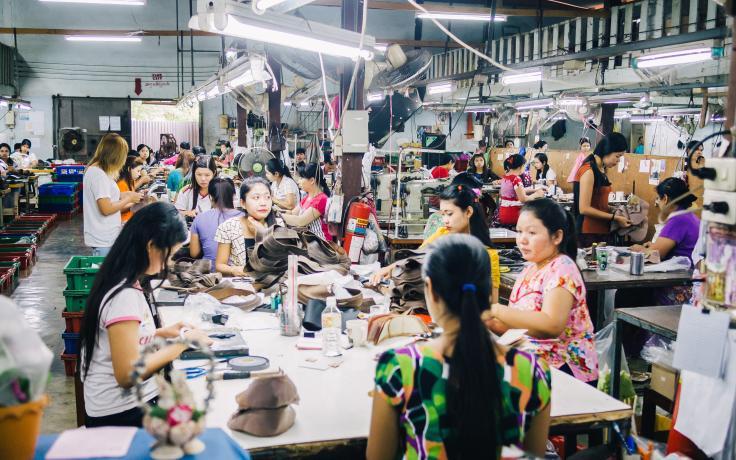
Policymakers in low- and middle-income countries play a key role in creating the enabling conditions for local business growth. Often, these strategies target export market access as a pathway for potentially transformative job creation and economic development. For example, more than 50 governments run trade promotion offices, and many countries (including high-income countries) implement industrial policy. These efforts are large investments, and it is important to understand their impacts and test effective design features, including by learning from global evidence. For example, the investment promotion agency of the Government of Tamil Nadu partnered with J-PAL South Asia from 2022 to 2023 for a series of evidence sharing sessions to inform its policies.
Governments also play an important role in stimulating growth by improving procurement of goods and services from the private sector. Government spending can amount to 20 percent of GDP in low- and middle-income countries, but public procurement processes can lack transparency. Local businesses, especially young and smaller firms, may also need training and resources to effectively access procurement opportunities. Governments can collaborate with researchers and civil society groups to pilot and test procurement reforms and targeted capacity building for businesses interested in bidding for public contracts. For example, research collaborations in Uganda and Liberia have led to identifying effective approaches.
The role of foreign assistance and philanthropy
Foreign assistance and philanthropic support can play a catalytic role in testing and generating evidence on market access programs, and sharing actionable lessons that businesses and governments can apply to their practice and implement at scale. These research funds make it possible for researchers to partner with private sector institutions and governments aiming to improve market access for small businesses. The UK’s Foreign, Commonwealth and Development Office, through initiatives like Private Enterprise in Low-Income Countries, and evidence-to-policy organizations like the International Growth Centre, have long funded portfolios of research at the intersection of trade, business growth, and job creation in low- and middle-income countries. Philanthropies such as Google.org, the Livelihood Impact Fund, and Wellspring Philanthropic Fund have supported similar efforts through J-PAL’s Jobs and Opportunity Initiative.
For research to be actionable, it is also important to gather and share lessons from market-based programs so others can build on what works. For example, BEAM Exchange, previously funded by USAID (among others), curates evidence and case studies on a digital knowledge exchange platform to make information from diverse programs accessible.
Discover more from J-PAL
Increasing Market Access for MSME: The role of e-commerce and transportation infrastructure
Discover more from other sources
Photos:
(1) Credit: Shutterstock.com
(2) Credit: Catastophe OL, Shutterstock.com
